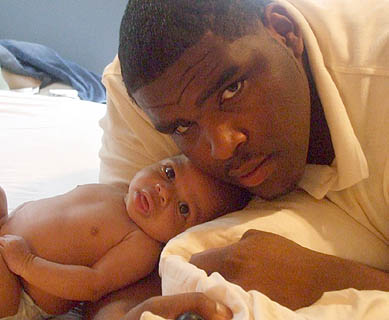According to a recent study, men need more support in their transition to fatherhood. The findings, which began as a thesis written by a midwife at a Swedish university, most likely ring true for men at any stage of fatherhood.
The men interviewed reported that, while it makes sense for the pregnant moms to get the primary attention and care during childbirth classes, the men themselves often felt secondary or unnecessary, and that made the process of becoming a dad more difficult for them. The men’s questions and concerns were sometimes ignored by the birthing coaches, or a question was answered but the answer was directed to the pregnant partner, not the man who asked the question.

In general, men reported a need for more places where they could share their fears and concerns about fatherhood. The researcher concluded, “There’s a need for support aimed specifically at men both before and after childbirth. This will benefit not only the man himself, but also the whole family.” More on the study.
It’s generally true that fathers everywhere, at any stage of the fathering journey, would benefit from more resources to help them be better dads. That’s one reason why we’re here and why this weekly email exists, and our efforts are only part of the support available to dads. There are more resources for fathers today than ever before, but there’s still a long way to go.
So for new fathers or any dads who may need a boost, here are 3 brief suggestions to help keep you going:
– Be proactive about finding support for your fathering.
It isn’t a one-man job! If you’re reading this email, that’s a great step, but there are many more ways to equip yourself as a dad: read up about fathering issues and challenges; ask an older dad whom you respect to meet you for lunch, and ask him lots of questions; take the initiative to organize regular meetings with other men that include discussions about fatherhood — like this dad did before his first child was born.
– Be a team with your child’s mom.
That may not be easy in some situations, but as a “parenting partner” who cares deeply for the same children and sees them as much or more than you do, she can be a valuable asset — because of her parenting insights, her unique perspective on your children, and her regular presence as someone who understands and is on your side. Do all you can to make that a successful partnership.
– Be a highly involved father.
This might seem “basic,” but research has shown that being an involved father can be a big source of satisfaction for a man. Capitalize on that. Allow the joy of bonding with your kids to keep you motivated in your fathering.
The good news is that most dads learn and adjust and do a great job of bonding with their babies … preschoolers … teenagers … and on down the line. So, you’ll get the hang of it. Being a dad does require major adjustments and sacrifices, but they’re all well worth it.
ACTION POINTS
- It is true that one of a dad’s key roles is to sympathize with his children’s mom and do what he can to lighten her load — especially a new mom. Commit to serving her and building a strong relationship.
- Dive in and participate in the everyday, nitty-gritty aspects of your child’s life, including child care, changing diapers, and so on. Remember, “love” isn’t just a feeling. It’s more about deciding to do what’s right for someone whether or not you feel like it.
- If you didn’t have a great home life as a child, spend time with other families to see how they interact and solve problems.
- For “veteran” dads, share with a new or expecting dad about some of your early struggles. Show him that no dad feels completely ready for fatherhood, but many of us adjust and do fine.
 Recommended Resources:
Recommended Resources:
– Hit the Ground Crawling by Greg Bishop
– Congratulations, You’re Gonna Be a Dad! What’s Ahead from A to Z for First-Time Fathers by Paul & Pam Pettit

